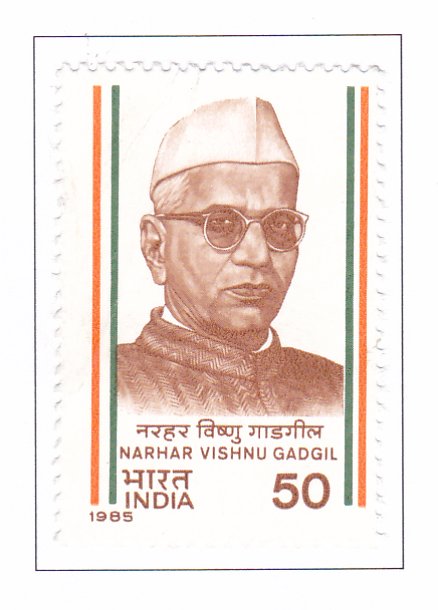Narhar Vishnu Gadgil (1896-1966)

Technical Data
| Stamp Set | India's Struggle for Freedom |
|---|---|
| Date of Issue | January 10, 1985 |
| Denomination | 50 p |
| Quantity | 1,500,000 |
| Perforation | comb 13 |
| Printer | Security Printing Press, Nashik |
| Watermark | No Watermark |
| Colors | Multicolor |
| Catalog Codes |
Michel IN 1011 Stamp Number IN 1077 Yvert et Tellier IN 827 Stanley Gibbons IN 1144 |
| Themes | Famous people | Headgear | Men | Optical Instruments | Politicians |
Shri Narhar Vishnu Gadgil, affectionately known as Kakasaheb Gadgil, was a multifaceted personality who left an indelible mark on Indian politics, literature, and social reform. Born on January 10, 1896, he emerged as a prominent freedom fighter, distinguished lawyer, and respected politician during his lifetime.
Early Life and Education
- Educational Background: Gadgil graduated from Fergusson College, Pune in 1918 and subsequently earned a degree in Law in 1920, laying the foundation for his future endeavors.
Influences and Nationalistic Spirit
- Leadership Inspirations: Influenced deeply by stalwarts like Lokmanya Tilak, Mahatma Gandhi, Jawaharlal Nehru, and Vallabhbhai Patel, as well as spiritual figures such as Swami Ramkrishna Paramhans and Swami Vivekananda, Gadgil dedicated himself to the cause of India’s freedom struggle from an early age.
Role in the Freedom Movement
- Active Participation: Gadgil joined the Indian National Congress in 1920 and became actively involved in various movements, enduring imprisonment on eight occasions for his commitment to India’s independence.
Political Career and Contributions
- Congress Leader: He served in pivotal roles within the Congress organization for over three decades, including as Secretary of the Poona District Congress Committee (1921-25) and President of the Maharashtra Pradesh Congress Committee (1937-45).
- Government and Legislative Service: Gadgil was elected to the Central Legislative Assembly in 1934 and later served as a Minister in independent India’s first Cabinet (1947-52), overseeing portfolios like Commerce, Works, Mines, and Power. He played a crucial role in initiating major development projects such as Bhakra, Hirakund, and Koyna dams.
- Public Service: Beyond politics, Gadgil contributed to various public associations and institutions, championing social reform movements in Maharashtra in the 1930s and serving as Vice-Chancellor of Poona University in 1964.
Literary Contributions
- Prolific Writer: Known for his literary prowess, Gadgil authored several books and articles spanning Politics, Economics, Law, History, and Oratory. His notable works include ‘Pathik’ (his autobiography), ‘Rajya Shastra Vichar’, ‘Subha Shastra’, ‘Vaktrutva Shastra’, and ‘Gyanbacha Arthashastra’.
- Recognition: His significant contributions to Marathi literature were acknowledged when he was elected President of the Marathi Sahitya Sammelan in 1962.
Legacy and Passing
- Enduring Impact: Gadgil’s legacy as a freedom fighter, political leader, and intellectual continues to inspire generations. He passed away on January 12, 1966, leaving behind a rich tapestry of achievements and contributions.
Commemoration
The Indian Posts & Telegraphs Department honors the memory and contributions of Narhar Vishnu Gadgil with a commemorative postage stamp, recognizing his role as a veteran freedom fighter, distinguished politician, and prolific writer who shaped the socio-political landscape of India.
This stamp serves as a testament to Kakasaheb Gadgil’s enduring commitment to India’s freedom struggle, his leadership in shaping post-independence India, and his literary contributions that enriched Marathi literature and thought.
